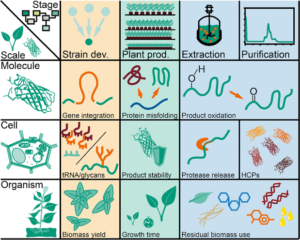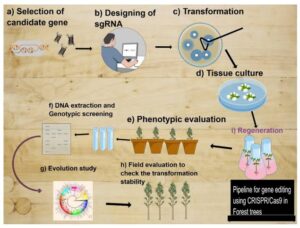Back to: Botany 400 Level
My ever-determined Afrilearn scholar, welcome again! You’re moving with real focus, and I’m proud of the strides you’re making. Today’s topic—Applications in gene annotation and molecular breeding—brings together technology and farming in a way that can change lives. Yes, even your local garri or tuwo can benefit from what you’ll learn here!
Applications in gene annotation and molecular breeding
Let’s bring it home. Imagine a farmer in Benue wants to grow yam that matures faster and resists pests. Instead of guessing or doing endless trial-and-error, scientists can now go straight into the plant’s genes, identify the traits they want, and breed better yams much faster. That’s the power of gene annotation and molecular breeding.

These are two important techniques used in modern plant biotechnology to improve crops, boost food security, and solve real agricultural problems in Africa and beyond.
What Is Gene Annotation?
Gene annotation is like putting labels on the parts of a book written in a language you’re just learning. DNA is like a very long story, and annotation helps scientists know:
- Where a gene starts and ends
- What the gene does (e.g., controls drought resistance, fruit colour, etc.)
- Which part codes for proteins and which doesn’t
Without annotation, it’s like reading a book without knowing which parts are important. Tools like BLAST, gene prediction software, and sequence databases help with annotation.
What Is Molecular Breeding?
Molecular breeding is using knowledge of DNA and genes to select and improve crops. Instead of waiting many years to see if a crop performs well, scientists use markers (known DNA sequences) to predict which plants carry desirable traits.
There are two major types:
- Marker-Assisted Selection (MAS) – Using DNA markers to pick the best plants for breeding.
- Genomic Selection (GS) – Analysing the entire genome to predict plant performance.
This saves time, reduces cost, and increases success.
Let’s say researchers in Ibadan want to develop cassava that produces more starch. They use gene annotation to identify the genes linked to high starch production. Then they use molecular breeding to select parent plants carrying those genes. The result? Cassava that gives more starch and earns farmers more money!
Why Is This Important in Africa?
- Speeds up breeding of crops suited to local conditions (drought, poor soil, pests)
- Improves nutritional content of crops (e.g., vitamin-rich maize)

- Reduces post-harvest losses
- Supports climate-smart agriculture
Summary
- Gene annotation helps scientists identify and label useful genes in a plant’s DNA.
- Molecular breeding uses this information to create better crop varieties.
- These tools save time, improve accuracy, and help develop crops that meet local needs.
Evaluation
- What is gene annotation in simple terms?
- How does molecular breeding differ from traditional plant breeding?
- Give one real-life benefit of using molecular breeding in Nigeria.
With this knowledge, you’re not just learning—you’re getting ready to transform African agriculture with science. Imagine the impact when local farmers plant better crops, grow more food, and earn more money—because of work you’ll do. Keep shining, keep believing, and remember: Afrilearn is always by your side. Let’s keep building the future together!
